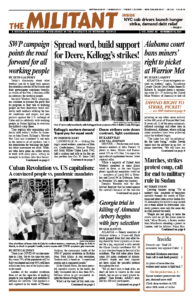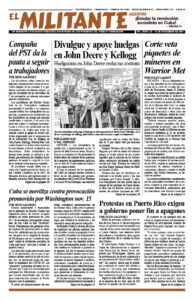ATLANTA — Family members of Ahmaud Arbery, a 25-year-old Black youth gunned down last year after being chased by three vigilantes as he was out for a jog, organized a rally outside the Glynn County courthouse Oct. 18 as jury selection began in the trial of his assailants. The trial takes place there, some 260 miles southeast of Atlanta. Arbery’s family and their supporters have called for peaceful protests throughout the trial.
“We all don’t have to look alike, we don’t all have to believe in the same beliefs, but we are so much greater together,” Thea Brooks, Arbery’s aunt, told the 100 rally participants.
Then they loaded into cars for a “Ride for Ahmaud.” Walks, runs and rides became a popular form of protest across the country demanding that all those involved in the shooting — along with county officials who attempted to cover it up — be prosecuted.
Arbery was chased and gunned down in February 2020 by Travis McMichael and his father Gregory. They were joined in the chase and fatal assault by William Bryan Jr., a neighbor who captured the shooting on his cellphone.
Greg McMichael is a retired cop and former investigator in the local prosecutor’s office. All three are charged with malice murder and felony murder. They also face federal hate crime and attempted kidnapping charges. They pleaded not guilty.
Only after protests swelled in the months following the shooting demanding the McMichaels be arrested did evidence begin to emerge of how the chase and killing unfolded. It took 74 days, and a number of changes in prosecutors, before charges were brought. It was a leak of Bryan’s video of the killing that broke the case open.
Arbery was jogging in Satilla Shores Feb. 23, a suburban neighborhood 25 miles from downtown Brunswick. The McMichaels told the police they got their guns and chased him in their truck because they suspected he might be involved in a burglary.
Arbery had entered a construction site briefly during his run, just minutes before he was fatally shot. He took nothing and no property was damaged. Family members and the attorney for the house owner say it’s likely he stopped for a drink of water.
For two months after the shooting local cops and prosecutors did everything possible to avoid arresting the McMichaels and to try to smear Arbery as a criminal. He had faced charges for possessing a weapon and for shoplifting earlier. Gregory McMichael had led the investigation into the shoplifting charge.
Cops initially told Arbery’s family that he had been killed while in the middle of a burglary. That was the version the McMichaels had given the cops when they arrived on the scene.
Government officials complicit
Local prosecutors Jackie Johnson, who first got the case, and then George Barnhill removed themselves, admitting they knew Gregory McMichael because he had worked in their offices. Before Barnhill stepped off the case, he told cops not to arrest the McMichaels, claiming they had acted legally under Georgia’s 1863 “citizen’s arrest” law and in armed self-defense.
In response to growing protests, that law was repealed in May. Under the new legislation, the ability of private citizens to make arrests is strictly limited. But this new law wasn’t in effect when Arbery was killed.
Prosecutor Johnson has been voted out of office and indicted for her conduct in the case. She is accused of violating her oath by “showing favor and affection” toward Greg McMichael during the investigation.
McMichael had called Johnson from the scene of the shooting to ask for her help. “Jackie, this is Greg. Could you call me as soon as you possibly can?” Johnson’s voicemail records McMichael saying. “I‘ve been involved in a shooting and I need some advice right away.”
The video that blew the case open was leaked by a supporter of the McMichaels, who claimed it showed it “wasn’t two men with a Confederate flag in the back of a truck going down the road and shooting a jogger in the back.”
It turns out McMichael’s truck has a Confederate battle flag on its license plate, a fact defense lawyers are trying to keep out of the trial.
Challenges in finding a jury
The trial began with efforts to select a jury, which presents challenges in a county of 85,000 people, given the extensive news reports on the shooting, the widely publicized video of it and protests against the killing across the country.
A number of the people called to report for consideration haven’t shown up. Even though the county is 69% Caucasian, defense attorneys say their case is more difficult because many of those no-shows are likely “white males, over 40, born in the South, who do not have a college degree.”
Still, the defense is not asking for a change of venue.
Fifty-five of the 64 potential jurors needed have been selected so far, the Nov. 1 Atlanta Journal-Constitution reported. After 64 are qualified by the judge, the process of selecting the 12 jurors and 4 alternates who will actually try the case begins.
During this phase the defense and prosecution will have unlimited chances to ask that the judge cut a prospective juror with or without cause. Attorneys on either side can challenge such requests if they suspect it is based on the juror’s sex or race. Some of those qualified for the pool said they had participated in protests against the shooting or that they had already formed an opinion on the case. One was a retired law enforcement officer, who, when asked what crime he thought had been committed here, answered “murder.”
Arbery’s family and all those who oppose police brutality and racial oppression, as well as those who care about the defense of rights all working people, need a fair trial and due process. They will follow closely as the trial unfolds.

